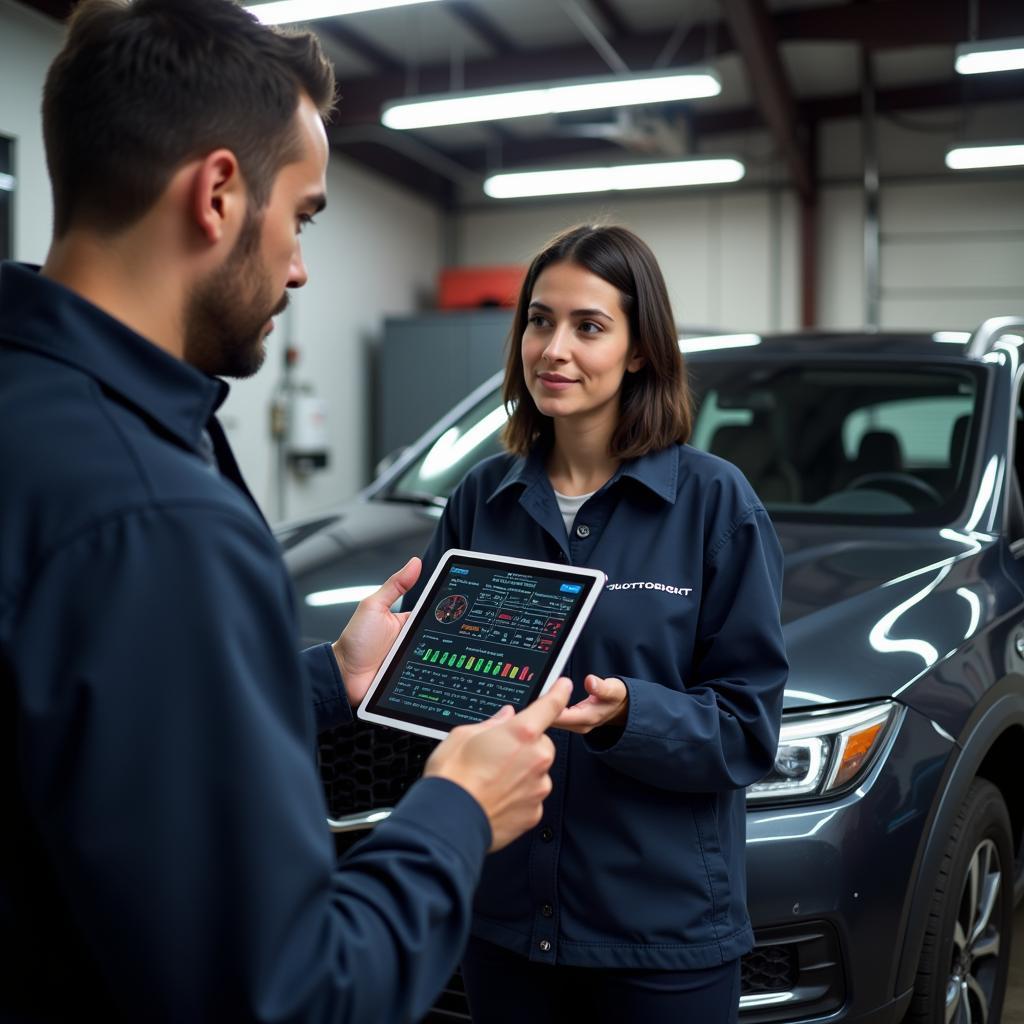“Full Car Diagnostic” – a phrase that sparks curiosity and concern for car owners. While modern vehicles are marvels of engineering, they’re also complex machines that can develop issues. Understanding what a full car diagnostic entails can save you time, money, and potential headaches on the road.
What is a Full Car Diagnostic Test?
A full car diagnostic test, often referred to as a full car diagnostics, delves deep into your vehicle’s computer system, acting like a comprehensive health checkup for your car. Using advanced full car diagnostic tools, technicians can retrieve data from your car’s Engine Control Unit (ECU) and other modules. This data reveals valuable information about your engine’s performance, transmission, exhaust system, brakes, and various other crucial components.
Why is a Full Car Diagnostic Important?
Think of a full car diagnostic test like a detective investigating a case. It helps pinpoint the root cause of car problems, especially when symptoms are vague or multiple warning lights illuminate your dashboard. Here’s why it’s crucial:
- Accurate Diagnosis: Forget guesswork. A full diagnostic provides specific trouble codes and data, guiding mechanics towards precise repairs.
- Early Problem Detection: Often, car issues start small. A diagnostic can catch these early signs before they escalate into major (and expensive) problems.
- Preventive Maintenance: Regular diagnostics can highlight potential issues, allowing for timely maintenance and preventing unexpected breakdowns.
- Improved Performance: By identifying and addressing underlying issues, a diagnostic can help optimize your car’s performance and fuel efficiency.
What Does a Full Car Diagnostic Check For?
A comprehensive full car diagnostic covers a wide range of systems and components:
- Engine and Transmission: Analyzing performance data, misfires, fuel/air mixture, and transmission shifting patterns.
- Exhaust System: Monitoring emissions, catalytic converter efficiency, and oxygen sensor function.
- Braking System: Inspecting Anti-lock Braking System (ABS), Electronic Stability Control (ESC), and brake fluid pressure.
- Airbag System: Verifying airbag sensors, modules, and deployment readiness.
- Electrical System: Examining battery health, alternator performance, and wiring integrity.
This is not an exhaustive list, but it illustrates the scope and depth of a full diagnostic assessment.
When Should I Get a Full Car Diagnostic?
Timing is key. Here are instances when a full diagnostic is highly recommended:
- Illuminated Warning Lights: Dashboard lights, like the “Check Engine” or “ABS” light, are signals that something requires attention.
- Performance Issues: Experiencing reduced fuel efficiency, rough idling, unusual noises, or difficulty starting your car? A diagnostic can help.
- Before Buying a Used Car: A pre-purchase inspection, including a full diagnostic, offers valuable insights into the car’s condition and potential hidden problems.
- Regular Maintenance: Just like regular health checkups, periodic car diagnostics (especially for older vehicles) promote optimal performance and longevity.
How Much Does a Full Car Diagnostic Cost?
The full car diagnostic cost can vary based on factors such as your location, the mechanic’s hourly rate, and the complexity of the diagnostic procedure. It’s best to contact local repair shops or dealerships to inquire about their specific pricing for a full diagnostic.
Finding a “Free Full Car Diagnostic Test Near Me”
While enticing, offers for a “free full car diagnostic test near me” should be approached cautiously. Some auto repair shops might provide a basic scan as a courtesy, but it might not be as comprehensive as a full diagnostic.
 Mechanic Explaining Car Diagnostic Results to a Car Owner
Mechanic Explaining Car Diagnostic Results to a Car Owner
Empowering Informed Decisions
In today’s technologically advanced automotive landscape, understanding the importance of a full car diagnostic is paramount. It’s an investment in your vehicle’s health, your safety, and your peace of mind.
Pro Tip from John Miller, Senior Automotive Engineer: “Don’t underestimate the value of a full car diagnostic. It’s like having a conversation with your car, allowing you to address issues proactively and keep your vehicle running smoothly for years to come.”
By equipping yourself with knowledge and partnering with a trusted mechanic who utilizes comprehensive full car diagnostic tools, you can navigate the complexities of car maintenance with confidence.

Leave a Reply